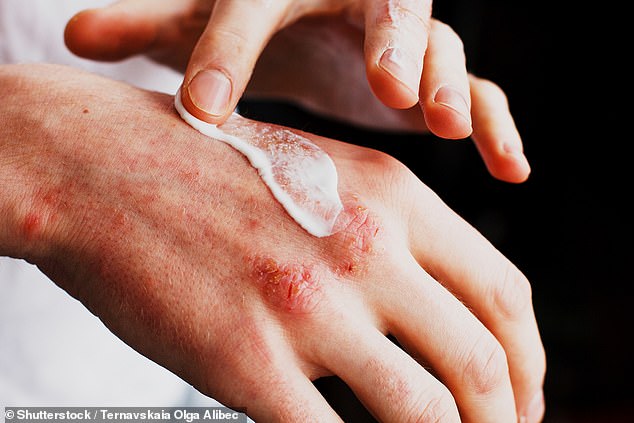Research shows that ultra-processed foods can give you an unsightly, lifelong skin disease




Eating a lot of ultra-processed food can increase the risk of an unsightly, flaky skin condition by more than a third, French research shows.
Experts came to this conclusion after analyzing health and nutrition data from more than 18,000 people who took part in a long-term nutrition study.
By dividing the group into three tiers based on the amount of ultra-processed food (UPF) they ate on average per day, the scientists found that the group that ate the most had a 36 percent increased risk of suffering from psoriasis.
Psoriasis is a skin condition that causes scaly, scaly patches of skin to appear on the body, including the face, and affects around one in fifty Britons.
It’s the latest study to suggest that eating UPFs could lead to multiple health harms – from an increased risk of heart disease, some cancers and even early death.
UPFs are a staple of the modern British diet and are an umbrella term covering a wide range of foods packed with artificial colours, sweeteners and preservatives, as well as calories and sugar.
Examples include ready-made meals, ice cream and even ketchup.
But British experts say the French investigation should be treated with caution because, like many of its kind, it does not prove that UPFs are directly to blame.

Eating a lot of ultra-processed food can increase the risk of an unsightly, flaky skin condition by more than a third, French research shows
In the study, published in the journal JAMA DermatologyThe authors theorized that eating a diet high in UPFs could make the body more susceptible to inflammation.
This, in turn, could increase the risk of developing psoriasis, which occurs due to inflammation of the skin cells.
The analysis suggested that the association between high UPF diets and psoriasis persisted even when aspects such as participants’ obesity and underlying conditions were taken into account.
Experts still don’t fully understand why psoriasis develops, but it is thought to be related to a dysfunction of the immune system, which causes inflammation in the body and accelerates skin growth.
Normally, skin cells are replaced every three to four weeks, but in psoriasis patients this happens approximately every three to seven days.
The study authors admitted this noted shortcomings in their study, such as relying on participants to self-declare that they suffered from the skin condition, which could have affected the reliability of the results.
They concluded that the relationship between psoriasis and UPFs needed further large-scale research.
British experts, who were not involved in the study, warned that the results should be treated with caution.

Psoriasis is a skin condition that causes scaly, scaly patches to appear on the body, and around one in fifty Britons suffer from it

UPFs are a staple of the modern British diet and are an umbrella term covering a wide range of foods that are packed with artificial colours, sweeteners and preservatives that extend shelf life.
Professor Wendy Hall, an expert in nutritional sciences at Kings College London, said it is crucial to remember that the research shows a link between psoriasis and high UPF consumption – not a cause and effect.
She suggested that it’s possible that having psoriasis could lead someone to eat more UPFs for comfort, as patients may experience problems with their self-esteem.
Professor Hall highlighted another shortcoming in the research that is common in UPF research: it does not distinguish between different types of heavily processed foods.
Experts have raised concerns that the term UPF is vague, as both a whole wheat bread, which has some health benefits, and a ready-made meal packed with salt, fat and sugar meet the criteria.
This can make it unclear which UPFs may cause a particular health problem.
Researchers have also emphasized that UPFs may not directly cause the health problems observed in studies.
Instead, they have suggested that eating a lot of UPFs could be a symptom of other problems, such as poverty, which could reduce people’s intake of fresh fruits and vegetables.
Professor Hall also said the relationship between diet and psoriasis is an ‘under-researched’ area worthy of further research.
Britain is the worst in Europe when it comes to eating UPFs, which make up an estimated 57 percent of the national diet.
They are thought to be a major cause of obesity, which costs the NHS around £6.5 billion a year.
They often contain colorings, emulsifiers, flavorings and other additives and typically undergo multiple industrial processes that research has shown affect the physical structure of foods, causing them to be quickly absorbed.
This in turn increases the risk of spikes and spikes in blood sugar levels, which decrease the feeling of satiety.
It’s also said to harm the microbiome: the community of “friendly” bacteria that live within us and depend on for good health.




